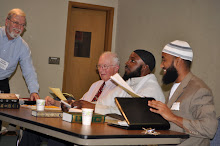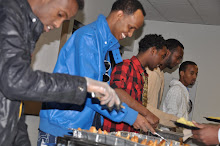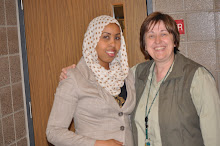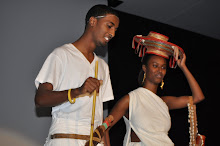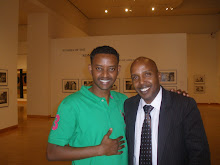By Britt Johnsen • bljohnsen@stcloudtimes.com • December 15, 2008
Mohamed Ismail was working close to 40 hours a week as a production worker in Clearwater. But the business cut its budget, reducing his work to about 25 hours per week.
He’s been looking for a job every day since that happened. He’s been praying and searching and waiting. And he has been talking with Mohamoud Mohamed, director of the St. Cloud Area Somali Salvation Organization.
People like Ismail may not be using advertisements or nonprofit groups as much as they are using Mohamed’s office in their job searches. His office on Wilson Avenue is a hub, a gathering place, for the Somali community. That’s where they find out about job openings and get support during hard times.
As a recession bleeds into the community, and more employers lay off workers or cut back hours, Mohamed sees how it is impacting the lives of many members of the Somali community.
It’s not that more people are coming in to Mohamed’s office. It’s what they’re talking about.
Before people even say hello to Mohamed in the morning, they ask him, “Do you have news for me?” They want to know if he knows about any jobs, Mohamed said.
But “we are not hearing good news,” he said.
Mohamed estimates that 1,500 Somali immigrants are unemployed.
He does what he can to help them. Some, though, have to move to other states. He’s helped find jobs for local Somali immigrants in places such as Lincoln, Neb. He’s also helped immigrants in St. Cloud find work in Hutchinson, Marshall and Little Falls.
Ismail is looking elsewhere for employment. Denver. California. Chicago.
But his family is here — his wife and his children, ages 9, 13 and 15. It would be tough to move them.
He is also thinking about becoming a taxi driver.
Few firms post hiring signs on the door. Still, he goes to companies and fills out applications. Visiting in person brings him a better chance at getting hired, so he can show he is interested and dedicated, he said. His best shot? When they say they’ll call if they have an opening, he said.
In the meantime, he’s done what his employer did: cut his budget.
And Ismail practices his Muslim faith. Mohamed explained that Muslims believe God, or Allah, writes people’s stories before they are born.
So Ismail, during his daily bread, is patient. He accepts the day ahead for what it brings. “You have to just adjust yourself to ... the situation,” he said, speaking through Mohamed as his interpreter.
“We appreciate it if we receive more. If we receive less, we thank God,” he said.
He expects this situation to continue for some time.
“It’s not going to change overnight,” Mohamed said. “I pray for our community.”
Sunday, December 21, 2008
Hands Across the World: Helping for 5 years
By TaLeiza Calloway • tcalloway@stcloudtimes.com • December 19, 2008
Five years ago, Hands Across the World began with the intent to help immigrants learn English and adapt to American culture. Over the years, the nonprofit organization has blossomed into a program that offers much more.
“It has taken us five years to shape the curriculum and become an integral program,” co-founder Brianda Cediel said. “I believe that this is one of the most important programs in our community.”
The mission
Hands Across the World serves as the first contact for many immigrants and refugees when they arrive in St. Cloud. Through classes and training, the program helps families survive after arrival. It has helped 160 new families this year and more than 750 families total, she said.
It has taken a long time to build the program because they take the time to meet all participants and address their needs, Cediel said. From knocking on doors and visiting with families to monthly sessions on a variety of issues, the needs of participants are a priority.
“This is a community-based program. Each need is different,” Cediel said. “Each person is one world — one culture.”
The merging of cultures enriches the program, and that diversity is evident among the students and staff.
About eight volunteers help with Hands Across the World programs.
They come from countries such as Mexico, Venezuela, Somalia and Togo.
“The volunteers are very committed,” Cediel said.
Sister Antonia (Tonie) Rausch, co-founder of the program, remembers the first winter for her Somali students in the program. They wore sandals in the snow.
Now, they teach each other about dressing warm, she said.
Rausch has taught in the program since its inception. The feedback has been positive about the program, and it is continuing to grow, she said.
“From day to day, we have about 30 to 50 people,” Rausch said. “You get a real taste of the realities of their lives (by working with them).”
Program growth
The program offers many services that benefit entire families. They include English, math, computer skills, health, cooking, civics and citizenship classes.
Changes to the program include extended adult education courses, a monthly women’s breakfast, child care for parents, preschool preparation for Early Head Start and parenting training via the Early Childhood STEM-A or the Science, Technology Engineering, Math and Arts program.
Cediel said Hands Across the World also has teamed up with the University of Minnesota’s Youth Institute to tackle youth gangs in the community. They work with police officers, parents and children in this program.
“We are building leaders for life,” Cediel said about the initiative. When crises happen, it is important to be proactive, she said.
Volunteer Mary Lou Lenz has taught English as a Second Language in the program for the past three years and says the program has been helpful. She often sees students after class, huddle up and continue working on assignments.
“The lack of English is their main problem when it comes to finding jobs (and more),” Lenz said. “They are very motivated to learn.”
Five years ago, Hands Across the World began with the intent to help immigrants learn English and adapt to American culture. Over the years, the nonprofit organization has blossomed into a program that offers much more.
“It has taken us five years to shape the curriculum and become an integral program,” co-founder Brianda Cediel said. “I believe that this is one of the most important programs in our community.”
The mission
Hands Across the World serves as the first contact for many immigrants and refugees when they arrive in St. Cloud. Through classes and training, the program helps families survive after arrival. It has helped 160 new families this year and more than 750 families total, she said.
It has taken a long time to build the program because they take the time to meet all participants and address their needs, Cediel said. From knocking on doors and visiting with families to monthly sessions on a variety of issues, the needs of participants are a priority.
“This is a community-based program. Each need is different,” Cediel said. “Each person is one world — one culture.”
The merging of cultures enriches the program, and that diversity is evident among the students and staff.
About eight volunteers help with Hands Across the World programs.
They come from countries such as Mexico, Venezuela, Somalia and Togo.
“The volunteers are very committed,” Cediel said.
Sister Antonia (Tonie) Rausch, co-founder of the program, remembers the first winter for her Somali students in the program. They wore sandals in the snow.
Now, they teach each other about dressing warm, she said.
Rausch has taught in the program since its inception. The feedback has been positive about the program, and it is continuing to grow, she said.
“From day to day, we have about 30 to 50 people,” Rausch said. “You get a real taste of the realities of their lives (by working with them).”
Program growth
The program offers many services that benefit entire families. They include English, math, computer skills, health, cooking, civics and citizenship classes.
Changes to the program include extended adult education courses, a monthly women’s breakfast, child care for parents, preschool preparation for Early Head Start and parenting training via the Early Childhood STEM-A or the Science, Technology Engineering, Math and Arts program.
Cediel said Hands Across the World also has teamed up with the University of Minnesota’s Youth Institute to tackle youth gangs in the community. They work with police officers, parents and children in this program.
“We are building leaders for life,” Cediel said about the initiative. When crises happen, it is important to be proactive, she said.
Volunteer Mary Lou Lenz has taught English as a Second Language in the program for the past three years and says the program has been helpful. She often sees students after class, huddle up and continue working on assignments.
“The lack of English is their main problem when it comes to finding jobs (and more),” Lenz said. “They are very motivated to learn.”
Subscribe to:
Comments (Atom)
